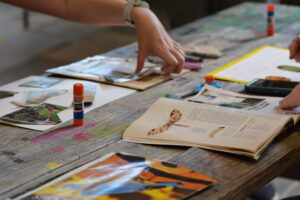Plants, Plows, and Pedagogy: Exploring Where Your Food Comes From
A 5-Day Summer Professional Development Institute for Grades 3-8 Educators
 Plants, Plows, and Pedagogy: Exploring Where Your Food Comes From explored the science, technology, and engineering involved in agriculture and other aspects of food production. Participating teachers dug into food systems, food justice, gardening in small spaces, the pathway of field to table, and more! Participants explored a variety of local farms, both in urban and rural settings, as they investigated ways to bring school gardening to their own classrooms.
Plants, Plows, and Pedagogy: Exploring Where Your Food Comes From explored the science, technology, and engineering involved in agriculture and other aspects of food production. Participating teachers dug into food systems, food justice, gardening in small spaces, the pathway of field to table, and more! Participants explored a variety of local farms, both in urban and rural settings, as they investigated ways to bring school gardening to their own classrooms.
The Institute began at Chestnut Hill Farm, exploring the property and playing a variety of games to introduce food systems. Participants learned more about the dairy process while making homemade butter. After participating in multiple investigations, teachers reflected on the activities and tied them back to individual MA STE standards and their own classroom.
 Day two at Chestnut Hill Farm participants identified a variety of fruits and herbs on the property and made chimichurri. Teachers discussed the benefits and difficulties of using fresh food in the classroom and the opportunity for cooking demonstrations in agricultural conversations. That afternoon, teachers furthered their knowledge of the cycle of nutrients and climate change through investigating vermicomposting. Participants each got to make their own vermicomposting bin with worms to bring back to their classroom.
Day two at Chestnut Hill Farm participants identified a variety of fruits and herbs on the property and made chimichurri. Teachers discussed the benefits and difficulties of using fresh food in the classroom and the opportunity for cooking demonstrations in agricultural conversations. That afternoon, teachers furthered their knowledge of the cycle of nutrients and climate change through investigating vermicomposting. Participants each got to make their own vermicomposting bin with worms to bring back to their classroom.
On Wednesday teachers visited the Regional Environmental Council (R.E.C) in Worcester, MA. Teachers got to engage with climate-resilient gardening and urban farming in their smaller space. The R.E.C shared a wealth of knowledge on the topics of contextualizing food justice, native vs. invasive plants, and pollinator gardens. That afternoon was filled with hands-on activities including the creation of seed eggs and planting a portion of a pollinator garden.
Day four was an entire day dedicated to the engineering design process and how to integrate it into your classroom discussions around food systems. Teachers chose a challenge within one of the food systems (food deserts, lack of composting in schools, water waste, etc.) and created a possible solution for their school community. Teachers presented their challenge and solution to each other and discussed the reality of implementing these solutions in their schools.
 The final day of the Institute was spent at Turn Back Time in Paxton, MA. Participants enjoyed exploring the diverse spaces at the farm, including both a production and education garden, animal housing, nature-based play spaces, and a beaver pond. Participants learned how to hatch chicks in the classroom and discovered the importance of nature-based learning. Teachers completed the day with a creative vision board, depicting how they planned to use this new perspective in their own classroom.
The final day of the Institute was spent at Turn Back Time in Paxton, MA. Participants enjoyed exploring the diverse spaces at the farm, including both a production and education garden, animal housing, nature-based play spaces, and a beaver pond. Participants learned how to hatch chicks in the classroom and discovered the importance of nature-based learning. Teachers completed the day with a creative vision board, depicting how they planned to use this new perspective in their own classroom.
Throughout the week, teachers participated in a variety of pedagogical experiences, exploring ways to add new content to their current teaching practice. Wade Institute instructors wove inquiry, phenomena-based learning, the Science and Engineering Practices, and the engineering design process into the science concepts introduced. Together, the pedagogy and science content learned throughout the course left teachers feeling more confident than before in teaching these engaging farm-to-table concepts.


